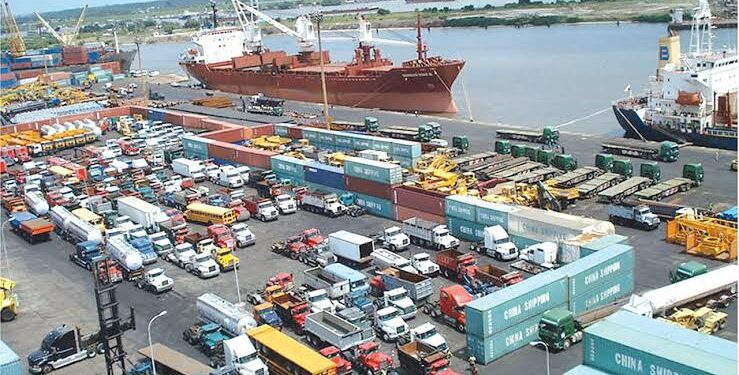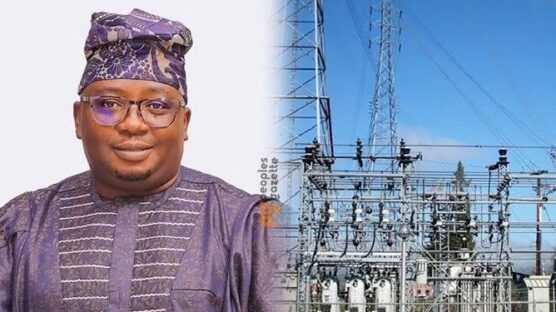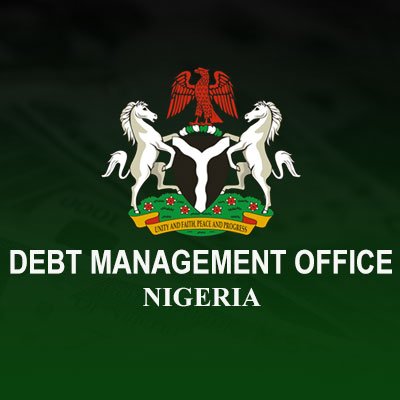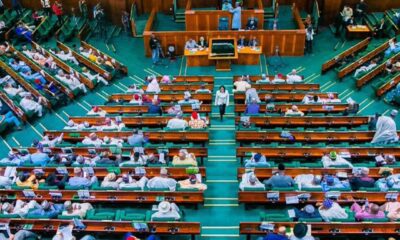Business
NPA secures $700m facility from Citibank to rehabilitate Apapa, Tin-Can Ports

By Seun Ibiyemi
The Nigerian Ports Authority (NPA) has negotiated a loan of $700million from Citibank to be funded by the UK Export Finance (UKEF), an export credit agency, to rehabilitate the Apapa and Tin-Can Island ports, Lagos.
The Ports Authority has also opened a discussion with another funding agency to secure financing for upgrading of the Eastern Ports including Calabar, Warri, Onne and Rivers Ports as well as the reconstruction of Escravos breakwater.
Speaking in Lagos on Wednesday during the signing of a mandate letter with Citibank Nigeria, Managing Director of the NPA, Mohammed Bello-Koko, said the mandate letter will be sent to the Debt Management Office for final review and approval.
He said the funds are ready and the reconstruction of the Lagos Ports will start soonest even as the NPA perfects plans to sign another mandate letter for the upgrading of the Eastern Ports in about a month.
“In the last two years, the Federal Government has realised the need for us to rehabilitate and reconstruct the ports all over the country. We have been having discussions with multilateral funding agencies who have sent various proposals that we have reviewed.
“What we did is to further discuss with interested parties and we realised it is better to separate the ports in Lagos from the ports in the East, and we are in discussion with other funding agencies to fund the construction of ports outside Lagos,” the NPA MD said.
According to him, the Citibank facility is the cheapest for the Ports Authority because it comes with affordable interest rates.
“Port efficiency is not about automation which we have already begun, it’s also about the physical infrastructure, which must be in place and that’s why we are automating. Automation will naturally bring efficiency, increase revenue and plug leakages,” he added.
Bello-Koko said that the NPA is putting the Port Community System in place, which is a platform that will improve trade facilitation.
“Currently in Nigeria, importers or exporters fill up to 30 to 40 forms for one transaction but the Port Community System will reduce the numbers of forms, human interference and ensure speedy clearance process in or out of the country,” he added.
Earlier, Managing Director of Citibank Nigeria Limited, Ireti Samuel-Ogbu, said the bank is committed to supporting NPA and the Federal Government in bridging infrastructure gaps.
“We are absolutely delighted to be partnering with NPA especially being the collection bank for foreign and local currency port levies. Now, supporting this strategic initiative through export credit financing to upgrade port infrastructure in Tin-Can and Lagos Ports is commendable. However, we are committed in supporting NPA and the Nigerian Government in all its endeavours especially in the infrastructure space,” Ireti Samuel-Ogbu stated.
According to her, Citibank was opportune to have met with Wale Edun, Minister of Finance, a few weeks ago where the port upgrading project was mentioned and he was very delighted about the project.
“Since NPA generates its own foreign revenue, we will be able to support foreign facilities from our resources because this project is very strategic and an important project for NPA and the country at large.
“We are looking forward to this project and we thank NPA for giving us this opportunity and hope to bring this into fruition as soon as possible,” Samuel-Ogbu added.
Business
FG requires $10bn to revive power sector


The Minister of Power, Mr Adebayo Adelabu says the Federal Government requires $10 billion investment yearly, to revive the power sector for the next 10 years.
Adelabu said this in Abuja on Monday, at a one day investigative hearing on halting the electricity tariff increase by the Nigerian Electricity Regulatory Commission (NERC) organised by the Senate Committee on Power.
“For this sector to be revived, the government needs to spend nothing less than 10 billion dollars annually in the next 10 years.
“This is because of the Infrastructure requirement for the stability of the sector, but the government cannot afford that.
“And so we must make this sector attractive to investors and to lenders.
“So for us to attract investors,and investment, we must make the sector attractive, and the only way it can be made attractive is that there must be commercial pricing,” he said.
Adelabu added, “If the value is still at N66 and the government is not paying subsidy ,the investors will not come.
“But now that we have increased the tariff for a Band, there is interest being shown by investors.”
The Minister said the major challenge in the sector was absence of liquidity, saying that the sector had been operating on a subsidised tariff regime, given the absence of a cost reflective tariff.
He said that the subsidy had not been funded over the years as huge liabilities were owed to the Generating Companies (GenCos) and the Gas Companies.
Adelabu said the inability of the government to pay the outstanding N2.9 trillion subsidy was due to limited resources, hence the need to evolve measures to sustain the sector.
He appealed to the lawmakers to support the process of paying the debt owed operators across the value chain of generation, transmission and distribution.
“The increase is based on supply, saying that any customer that does not receive 20 hours power supply will not be made to pay the new tariff,” he said.
He said the government was committed to ensuring sustainable reform in the sector, saying that there was a need to clear the outstanding debt owed to GenCos and Gas companies.
To improve power supply, he said the government was investing in hydro electric power, adding that construction of 700 mega watt power in Zungeru had commenced, while Kashimbila Hydroelectric power plant of 40 megawatt was awaiting evacuation to improve generation.
The Minister said there was also an ongoing investment of 26 small hydro power dams to boost electricity production across the country.
However, members of the committee in their separate remarks decried the experiences of Nigerians on electricity supply over the years, despite the unbundling of the sector.
Sen. Lola Ashiru, the Vice-Chairman of the committee said Nigerians were paying for inefficiency of power sector operators.
Ashiru said there was a lot of inefficiency across the value chain of generation, transmission and distribution..
He said poor Nigerians must be protected, adding that there was a need to consider a reversal of the tariff increase.
Sen. Solomon Larlong said there was no consultation before the increase, adding that issues of palliative should have been discussed and provided before the tariff increase.
The Chairman of the Committee, Sen. Enyinnaya Abaribe, said what Nigerians wanted was a solution to the issues and ways to ensure liquidity in the sector.
He also decried the non appearance of a company “ZIGLAKS” over the failed agreement to provide prepaid meters for Nigerians.
He alleged that the company had received N32 billion in 20 years to meter Nigerian electricity consumers.
Sen. Adamu Alero said due consultation was not made before the tariff increase.
He said the public was not at peace with the increase, saying that the increase was over 200 per cent, hence the need for a reversal of the tariff increase.
Business
Tribunal stops MultiChoice from increasing DStv, Gotv subscription rates


A Competition and Consumer Protection Tribunal (CCPT) sitting in Abuja, on Monday, restrained Multi-Choice Nigeria Limited from increasing its tariffs and cost of products and services scheduled to begin on May 1.
The three-member tribunal, presided over by Saratu Shafii, gave the interim order following an ex-parte motion moved by Ejiro Awaritoma, counsel for the applicant, Festus Onifade.
The tribunal, in a ruling, restrained Multi-Choice from going ahead with an impending price increase scheduled to take effect from May 1, pending the hearing and determination of the motion on notice filed before it.
“The 1st defendant is hereby restrained from taking any step(s) that may negatively affect the rights of the claimant and other consumers in respect of the suit pending the hearing and determination of the motion on notice,” Shafii declared.
She, therefore, directed all parties in the suit to appear before tribunal on Ma 7 at 10am for the hearing and determination of the motion on notice.
Onifade, in the suit marked: CCPT/OP/2/2024, had dragged Multi-Choice Nigeria Ltd and Federal Competition and Consumer Protection Commission (FCCPC) before the tribunal.
In the suit filed on April 29, Onifade, also a legal practitioner, sought two orders.
These include, “an order of interim injunction of this honourable tribunal restraining the 1st defendant whether by themselves, her privies, assigns by whatsoever name called from going ahead with impending price increase scheduled to take effect from 1st May, 2024, pending the hearing and determination of the motion on notice.
“An order restraining the 1st defendant from taking any step(s) that may negatively affect the rights of the claimant and other consumers in respect of the suit pending the hearing and determination of the Motion on Notice.”
Other members of the tribunal include Thomas Okosun and Dr. Umar Duhu.
Recall that the company had, on April 1, 2022, hike the prices of all its packages.
Business
DMO sells treasury bills worth N2.669trn in March — Report


The Debt Management Office (DMO) sold Treasury Bills (T.bills) valued at N2.669 trillion across its auctions in March 2024.
This was contained in the FMDQ Markets Monthly Report for March seen by newsmen.
The amount represents a 3.07 percent (N79.54 billion) month-on-month (MoM) increase in the value of T-bills sold across auctions in February 2024 (N2.589 trillion).
Similarly, the DMO sold FGN Bonds worth N608.86 billion (inclusive of N133.20 billion non-competitive bids) via the issuance of a new three-year as well as the re-opening of a seven-year (7Y) and 10-year FGN bonds in March 2024.
The report noted that the total sale represents a 35.30 percent oversubscription of the amount offered and a 59.27 percent (N886.05 billion) MoM decrease on the amount sold in February 2024 (N1.494 trillion) across the 7Y and 10Y FGN bond maturities.
In March 2024, the CBN sold open market operations (OMO) bills worth N1,056 trillion at auction in the primary market.
According to the report, there were no new listings of non-sovereign bonds on the FMDQ Exchange in March 2024.
“However, Corporate bonds worth N15.00 billion matured and were redeemed resulting in a 0.68 percent (N15.00 billion) MoM decrease in the value of Non-Sovereign Bonds outstanding to N2.194 trillion in March 2024,” it said.
The report stated that the total value of commercial papers (CPs) quoted on the FMDQ Exchange in March 2024 was N112.62 billion, representing a MoM increase of 123.76 percent (N62.29 billion) from the value of CPs quoted in February 2024.
“Quoted CPs were issued by institutions from various sectors including Financial Services (10), Manufacturing (4), Retail (2), Health & Pharmaceuticals (1), Agriculture (1), Technology (1), and Chemical Supply & Oil Field Service (1). However, N39.26 billion CPs matured and were redeemed resulting in a 9.28 percent (N73.36 billion) MoM increase in the total outstanding value to N864.11 billion in March 2024,” it said.
…Secondary market turnover
According to the report, secondary market turnover on FMDQ Exchange in March 2024 was N48.87 trillion, representing a MoM and YoY increase of 21.22 percent (N8.55 trillion) and 100.67 percent (24.51 trillion) from February 2024 and March 2023 figures, respectively.
Foreign exchange (FX) and money market (MM) transactions dominated secondary market activity, jointly accounting for 75.36 percent of the total secondary market turnover in March 2024.
-
capital market2 years ago
Rt.briscoe, FBNH, Others halts negative performance of stock market
-
Finance3 months ago
Court orders Sen. Victor Umeh to repay N136m bank debt to AMCON
-



 Abuja Update2 months ago
Abuja Update2 months agoUNDP, FG partnership needed to achieve inclusion, equity- Minister
-
Abuja Update1 month ago
Banks drive stock market performance with N147bn gain
-



 Business1 week ago
Business1 week agoTingo Group unveils Tingo Electric, Tingo Cola drink at Lagos launch
-



 Health2 weeks ago
Health2 weeks agoCapacity training will reduce migration of health workers- NPHCDA
-



 Infotech4 weeks ago
Infotech4 weeks agoWorld Backup Day: NITDA urges Nigerians to ensure backup of data
-
News4 months ago
Oil thieves sponsoring malicious media campaign against Navy – Spokesman














